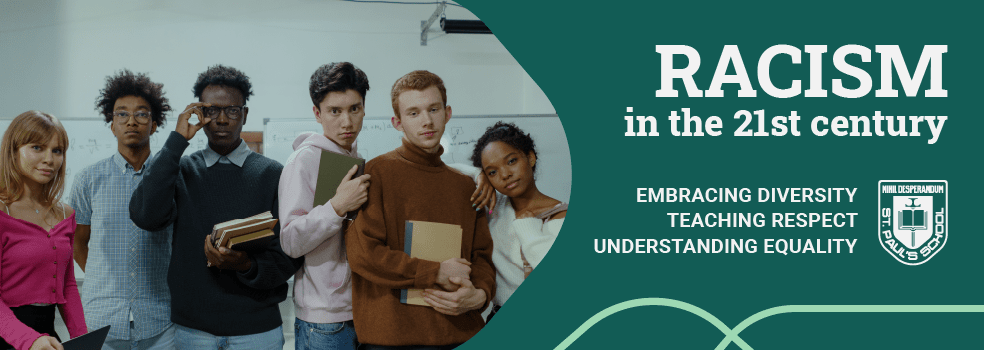18 Nov Racism in the 21st century

Racism in the 21st century. Embracing diversity … teaching respect … understanding equality.
When charged with the goal to develop competent global learners we are constantly reminded of the need to help students understand the concepts of race and ethnicity. This understanding helps to build awareness of the role they play in society specifically as it relates to systems of power and privilege.
We know that students who learn about different cultures and origins during their education feel more comfortable and secure later in life. As educators we understand and believe firmly in the importance of talking about equality in the classroom. As members of a forward-thinking community, we have clear that we want our students and children to be respectful in all their social, academic, and later professional interactions. This then begs the question as to why as a school, community, country, and global world we are still fighting to dismantle racist and prejudice views? Views that perhaps sometimes we don’t even realize we have.
Understanding racism and what it means in the 21st century is more complex then ever before. We live in a society where racism has many faces and appears in many forms. It is so challenging to talk about institutionalized or structural racism, and complex to understand some of the nuances of subtle racism where perhaps it is not so glaringly obvious. Whilst many times we are quick to state that we (as individuals, families, or groups) are not prejudiced and that we don’t tolerate racist views it’s harder for us to assess and understand how our social construct has naturally engrained in us a certain level of biased perspectives. This reflection however is critical to ensure we have a clear perspective on how society works.
It is also important to reflect on the fact that we are living in a technological world where we are all connected with instant messaging, social media, and a continuous stream of information. Many times, we are unaware of the subtle messages these inputs have on our beliefs and our prejudices. Adolescents spend increasingly more time online and are particularly vulnerable to discrimination. What they see and share has a direct impact on the development of their neural network development specifically as it relates to the development of empathy, one of the most important skills for success in today’s world.
How we prepare our students at St Paul’s School.
At St. Paul’s we believe that it is our job to engage students in their learning through innovative practices and help them examine history and culture always through the lens of equality and social justice. We aim to equip them with skills to develop criteria to help them understand the messages and images they consume daily. In order properly prepare our students for a globalized and diverse future we believe it is our responsibility to incorporate racially and culturally responsive instruction into all our classrooms throughout all age groups. It is our job to help students understand issues of race and racism so that they can play an active role in helping to dismantle systemic inequalities.
Claire Neely
ESO Coordinator


